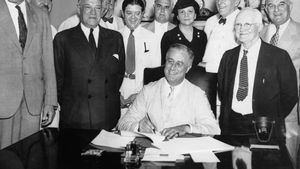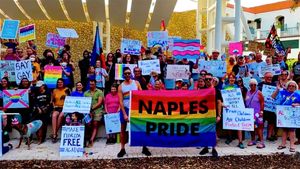Thanksgiving is almost upon us. Yay?
For some lucky queer folks, this actually is a time of familial fellowship, where you’re surrounded by the loving and understanding embrace of your family. But for far too many queer people, this time of year is fraught, especially now in the aftermath of the presidential election.
First things first, if you’ve decided that you’re not going home for the holidays this year, particularly if you’re feeling unsafe — literally or emotionally — that’s a totally valid choice, asAmie Grant, licensed professional clinical counselor and founder of Take Up Space Therapy Services tells PRIDE. “You don’t owe anyone your time, presence, or emotional labor — especially not family members who have voted against your rights or those of the communities you care about. Choosing to prioritize your mental health and safety by staying away is an act of self-preservation, not selfishness,” she says.
However, for those who are feeling a lot of understandable trepidation but are still choosing to go home, there are some things you can do to help protect your well-being and take care of yourself after the fact, according to the experts.
Name the elephant in the room — to yourself.
There may be plenty of gaslighting at the dinner table this year, but you can start to set yourself up for success by acknowledging the truth of the situation for yourself beforehand.
“Before stepping through the door, take five minutes to sit in your car or a quiet space and acknowledge what’s happening,” advises Grant. “Say to yourself: ‘This is going to be hard. Their votes hurt me, and I’m allowed to feel angry about that. I don’t have to fix it or make them understand right now. I just have to get through this moment.’ Write it on a note in your phone if you need to revisit it during the day,” she recommends.
Set your boundaries.
It’s also totally acceptable to decide what behaviors are not acceptable coming from your family and clearly setting those expectations, Cory Schneider, an MA, LMFT, SPHR, CDE, specializing in LGBTQ+ affirmative psychology, tells PRIDE.
“Setting boundaries before you arrive is key. Define what topics are off-limits and what behaviors you will not tolerate from others,” he advises. “You might want to communicate those boundaries ahead of time, or have a script ready for when they’re needed.”
He continues, “Boundaries are a powerful way to protect yourself because they help you stay in control of what you’re willing to engage with, reducing emotional vulnerability. And remember, it’s perfectly okay to step away or take a break from a conversation if it’s getting too overwhelming.”
Bring your own comfort items.
While we all hope our loved ones will know how to act right, the reality is some don’t — or won’t — and in that case having ways to self-soothe will be essential. Grant says that bringing a comfort item from home can be helpful in those moments. “Pack a small ‘grounding kit’ for the trip — this could be a stress ball, noise-canceling headphones, a calming essential oil, or a book that makes you feel seen (think something like All About Love by bell hooks). Having these items on hand can help you regulate your emotions and find moments of peace, even in a challenging environment,” she advises.
Identify your support system.
While you may be away from your chosen family, you don’t have to go it alone. This is why Schnieder suggests identifying your support system before you go. “Think about a few trusted friends or community members you can check in with during your visit,” he suggests. “Create a plan to text, call, or video chat when things feel tough. Having an external source of affirmation and understanding is grounding and helps counterbalance any negativity you might face.”
“It’s a reminder that you are not alone and that there are people who truly see and value you,” he adds. “LGBTQ Affirmative models emphasize the importance of community care and finding spaces where you can feel validated and supported.”
Set a small, joyful goal for yourself.
You know that saying, “it’s the little things that matter”? Yeah, that’s true here as well. Sometimes simply having something to look forward to and that you know will make you happy can get you through the hard moments during the holiday. “Plan one thing that will make you happy during the trip. Maybe it’s visiting your favorite coffee shop, going on a walk in nature, or carving out 10 minutes in the evening to rewatch a clip from your favorite comedy,” says Grant. “These small moments of joy remind you that this trip doesn’t define your entire holiday season—you’re still in control of creating moments that feel good.”
Schneider calls it creating “a self-care exit plan,” because it allows you to exit the situation, even if just for a quick reset. “It might mean taking a walk, finding a quiet spot to breathe deeply, or retreating to watch a favorite show or read a book,” he explains. “This ‘exit strategy’ lets you disengage from stressful situations and refocus your energy on something comforting and affirming. The goal is to give yourself permission to pause, regulate, and recharge when things become emotionally intense—recognizing that stepping back is a way to care for yourself.”
The best advice for aftercare once you leave.
Congrats, you made it through the day! You’ve dodged the uncomfortable questions, the political talk, the not-so-subtle digs, and have eaten your last bite of pumpkin pie.
Still, it’s not uncommon to feel an “emotional hangover” after the get-together. This is why Schneider says aftercare is just as important as preparation. “When you leave, make time for intentional aftercare. Take a day or two to decompress if possible — reconnect with your support system, return to your favorite activities, and let yourself feel whatever emotions arise without judgment,” he says.
Here’s what that aftercare can look like:
Lean into radical rest.
It’s OK to take a breather when and if you need it, says Grant. “Rest isn’t just recovery; it’s an act of rebellion in a world that demands you keep going no matter what,” she explains. “After enduring harm or invalidation, prioritize activities that nourish you: sleep in, binge-watch queer joy-filled media, or take a day to exist without any expectations. Rest is resistance, and it’s how we build strength to keep going.”
Channel your rage into action.
Then, because action can be empowering and healing, Grant says to use those post-holiday feelings as motivation. “Anger can be exhausting, but it’s also a tool for transformation,” she says. “Use it to fuel your next step. Donate to a mutual aid fund, write postcards for progressive candidates, or attend a community meeting. Taking action reminds you that change is possible and that you’re part of a larger movement for justice.”
Reclaim your holiday on your own terms.
It’s sometimes easy to forget that holidays are about joy and celebration — particularly when your family makes it hard to do so. That said, just like how you don’t owe them your time, you also don’t owe them your queer joy.
“If the family holiday was draining or disheartening, create a new tradition just for you or your chosen family,” says Grant. “Host a Friendsmas dinner, bake cookies while blasting a queer holiday playlist, or take yourself out for a hike or coffee. Centering joy and community in ways that feel good to you helps rewrite the narrative of what this season can mean.”
Lean into your compassion and empathy.
Finally — and this one may feel a little more tricky — Schneider says to try and “view others who may disagree with your values and beliefs with compassion.”
OK, stay with us here, because this isn’t any of that “when they go low, we go high,” stuff. This is about finding healing in compassion, FOR YOU.
“This doesn’t mean accepting harmful behavior or compromising your boundaries, but rather understanding that many people are influenced by their own fears, insecurities, or limited perspectives,” continues Schneider. “Seeing them through this lens can help reduce the emotional toll of confrontation and keep you from internalizing negative attitudes. Compassion doesn’t excuse harmful actions, but it allows you to protect your own peace by not carrying the weight of others’ biases. Remember, you are deserving of peace and affirmation, always.”
Experts cited:
Amie Grant, Licensed Professional Clinical Counselor and founder of Take Up Space Therapy Services
Cory Schneider, MA, LMFT, SPHR, CDE, specializing in LGBTQ+ affirmative psychology, men’s psychology, emotionally focused couples therapy (EFT), and relationship coaching.









































































































































